Every mental health professional knows the strain of documentation burdens. They keep healthcare providers tied to their desks, pulling focus from what matters most - quality patient care.
You spend hours after patient visits crafting clinical notes instead of focusing on patient interactions that define your practice. Over time, this can lead to burnout, longer workdays, and less time for clients.
AI medical scribes are transforming this reality for mental health professionals everywhere.
These advanced automation solutions can reduce your documentation time by 30–60% while maintaining clinical accuracy, freeing you to focus on therapeutic work, not paperwork.
This guide compares the top AI scribe solutions specifically designed for healthcare professionals in mental health. You’ll discover which tools offer seamless integration with your workflow and how to choose the right solution for your practice.
What Are AI Medical Scribes and Why Mental Health Providers Need Them
AI medical scribes are software tools that listen to your therapy sessions in real time (or use your recordings) and automatically generate accurate, structured clinical notes for your EHR.
Instead of typing out every SOAP or DAP note after sessions, these tools handle the heavy lifting with speech-to-text transcription, natural language processing, and AI-powered summarization.
For mental health professionals, this is a game-changer because:
- Administrative work drops drastically – Most providers save 15–30 minutes per session, slashing hours of after-hours “pajama time.”
- Patient interactions improve – You can stay fully present in sessions instead of glancing at your laptop to jot things down.
- Documentation quality stays consistent – AI scribes produce standardized, billing-ready notes, reducing errors and missed details.
- HIPAA compliance is built-in – Top tools encrypt all data, sign BAAs, and keep you audit-ready.
- More time for clients, less for paperwork – You get back the mental bandwidth to focus on therapy, not admin work.
In short, AI medical scribes remove the documentation burden so you can reclaim your time, reduce burnout, and maintain high-quality clinical records without sacrificing patient care.
How AI Medical Scribes Work
AI medical scribe technology, often using ambient AI listening capabilities, operates through three core functions that streamline your healthcare documentation process:
Real-time session recording and transcription - The AI powered system listens to your patient visits through your computer or mobile device and converts speech to text with high accuracy using natural language processing.
Automated note generation using AI - Advanced machine learning algorithms analyze the transcription and generate comprehensive clinical notes in formats like SOAP or DAP.
Integration with EHR systems - Clinical notes can be directly inserted into your electronic health record or copied over seamlessly through various EHR systems.
Unique Benefits for Mental Health Practices
AI medical scribes offer specific advantages that address the unique challenges you face as a healthcare provider in mental health:
Reduced documentation time - While often associated with primary care, these tools bring unique advantages to mental health providers too. Most providers see 30-60% time savings on note generation, giving you hours back each week to focus on patient care.
More focus on patient interactions - You can maintain eye contact and be fully present during patient encounters instead of splitting attention between patients and note-taking.
Consistent, professional note quality - AI generates standardized, comprehensive clinical notes that meet clinical documentation and billing requirements every time.
HIPAA compliant security features - Reputable AI medical scribes include encrypted data storage, secure transmission, and HIPAA compliance with mental health-specific data privacy protocols specifically designed for healthcare professionals.
Top 5 AI Medical Scribe Tools for Mental Health Providers
Here’s a detailed breakdown of the leading AI medical scribes designed specifically for mental health practitioners or offering strong mental health support.
Supanote - Built Specifically for Mental Health
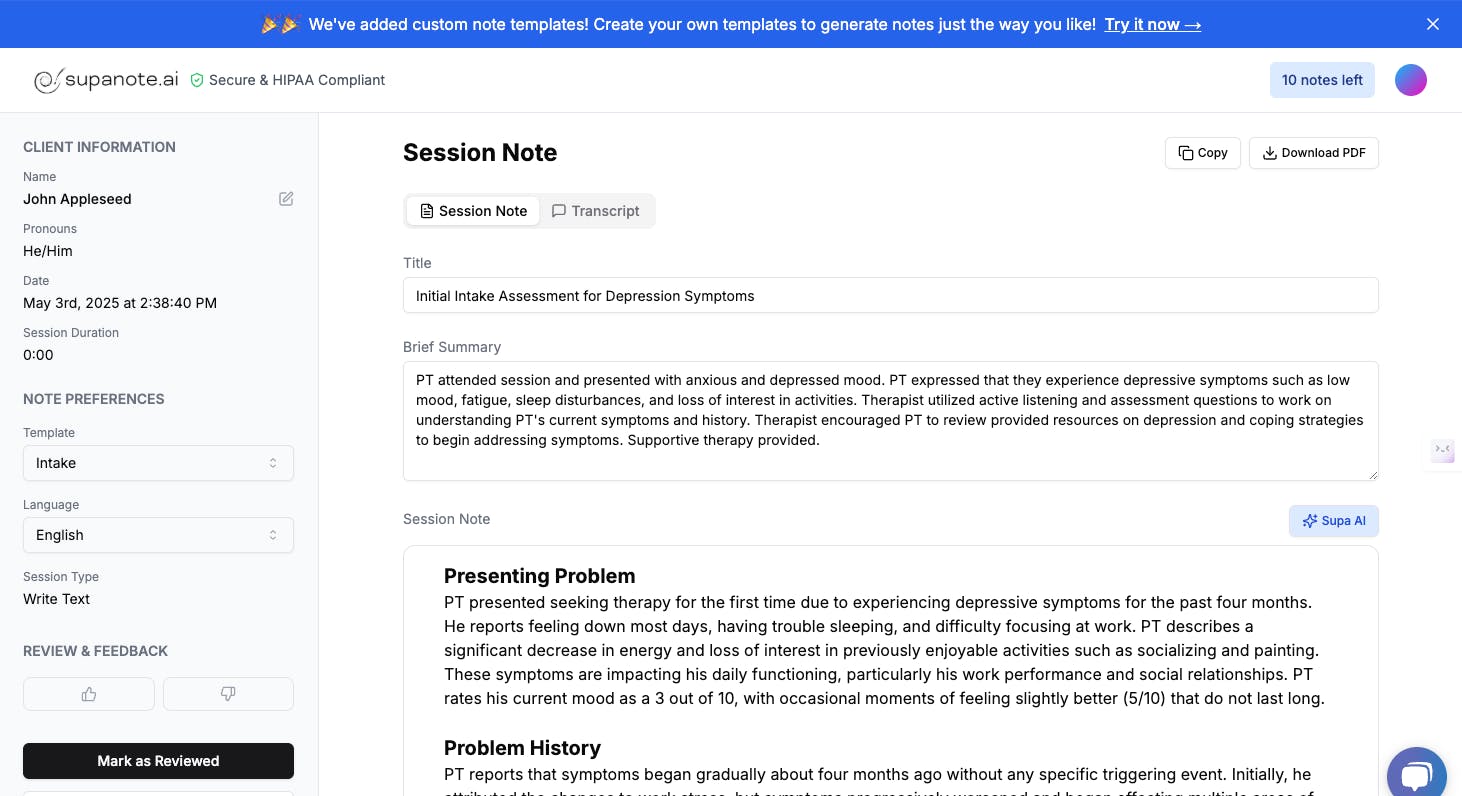
Supanote stands out as one of the few AI scribes built from the ground up for mental health providers. Founded by healthcare professionals, this AI medical scribe understands the unique documentation needs of therapy practice workflows.
- Native EHR autofill with ‘Super Fill’ button that transfers therapy notes directly to your existing systems
- Deep personalization that learns your writing style and clinical preferences over time
- Mental health-specific templates optimized for therapy patient encounters and clinical language
- Comprehensive HIPAA compliance with mental health-specific data security measures
- Templates for various therapy modalities including CBT, DBT, and trauma-informed care
Pricing (Annual billing): Starting at $19.99/month for 40 clinical notes, Professional at $39.99/month for 100 notes, Premium at $69.99/month for unlimited notes (Annual billing)
Best suited for: Solo practitioners and small clinics seeking specialized therapy documentation solutions
Mentalyc - Popular Mental Health Documentation Tool
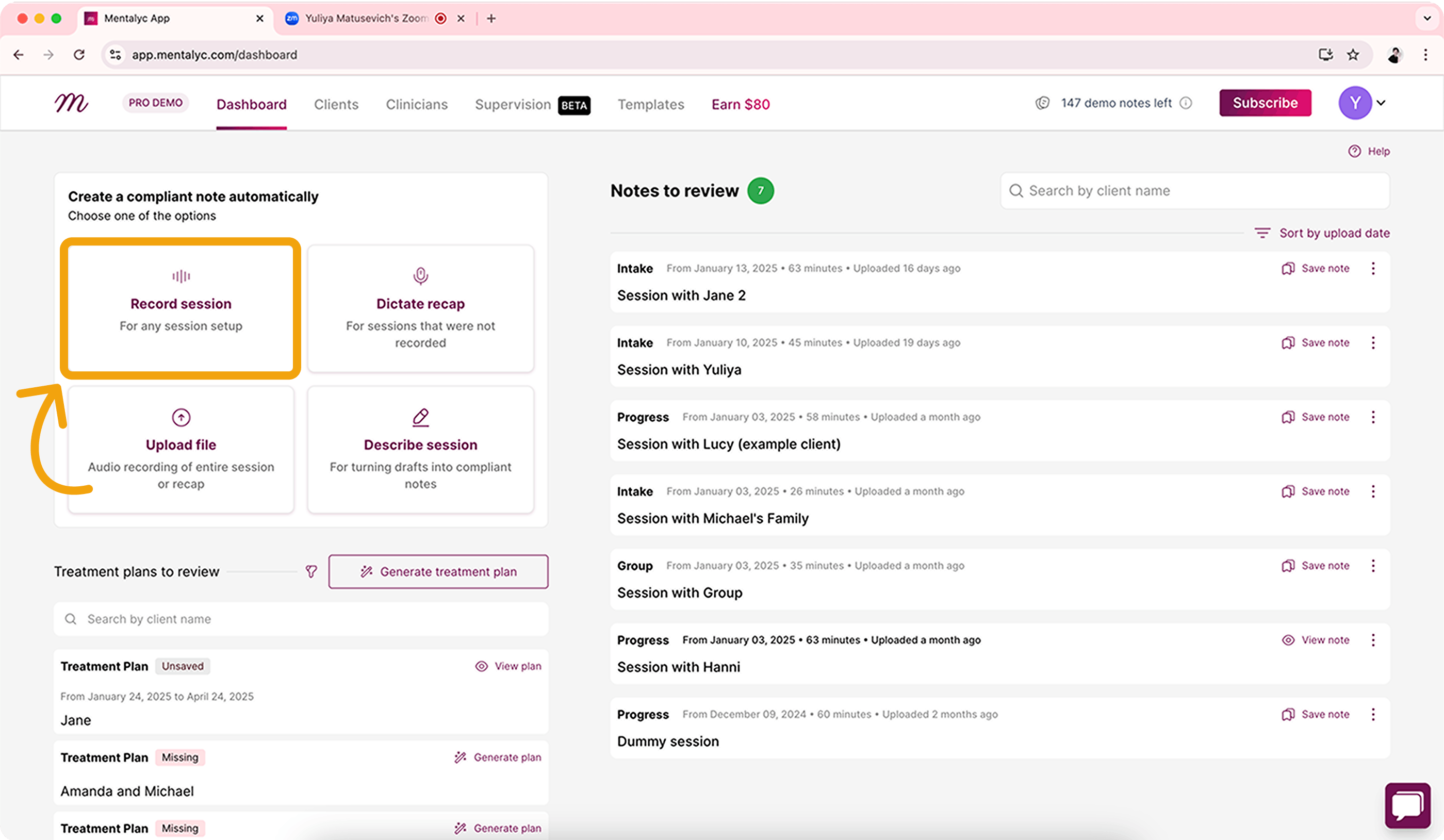
Mentalyc offers an easy-to-use solution that focuses on the essentials of mental health documentation. Designed for efficiency, it delivers ready-to-use clinical note formats.
- Pre-built SOAP and DAP templates specifically designed for mental health documentation
- Simple copy-paste workflow compatible with most EHR systems
- Team collaboration tools to ensure practice-wide consistency in note quality and accuracy
- Treatment plan suggestions based on patient session content
- Progress tracking features for monitoring patient improvement over time
Pricing: Mini $14.99/month (40 notes), Basic $29.99/month (100 notes), Pro $59.99/month (160 notes), Super $99.99/month (330 notes) - Billed annually
Best suited for: Individual clinicians and small teams seeking proven mental health templates with collaborative features
Upheal - Comprehensive Mental Health Platform
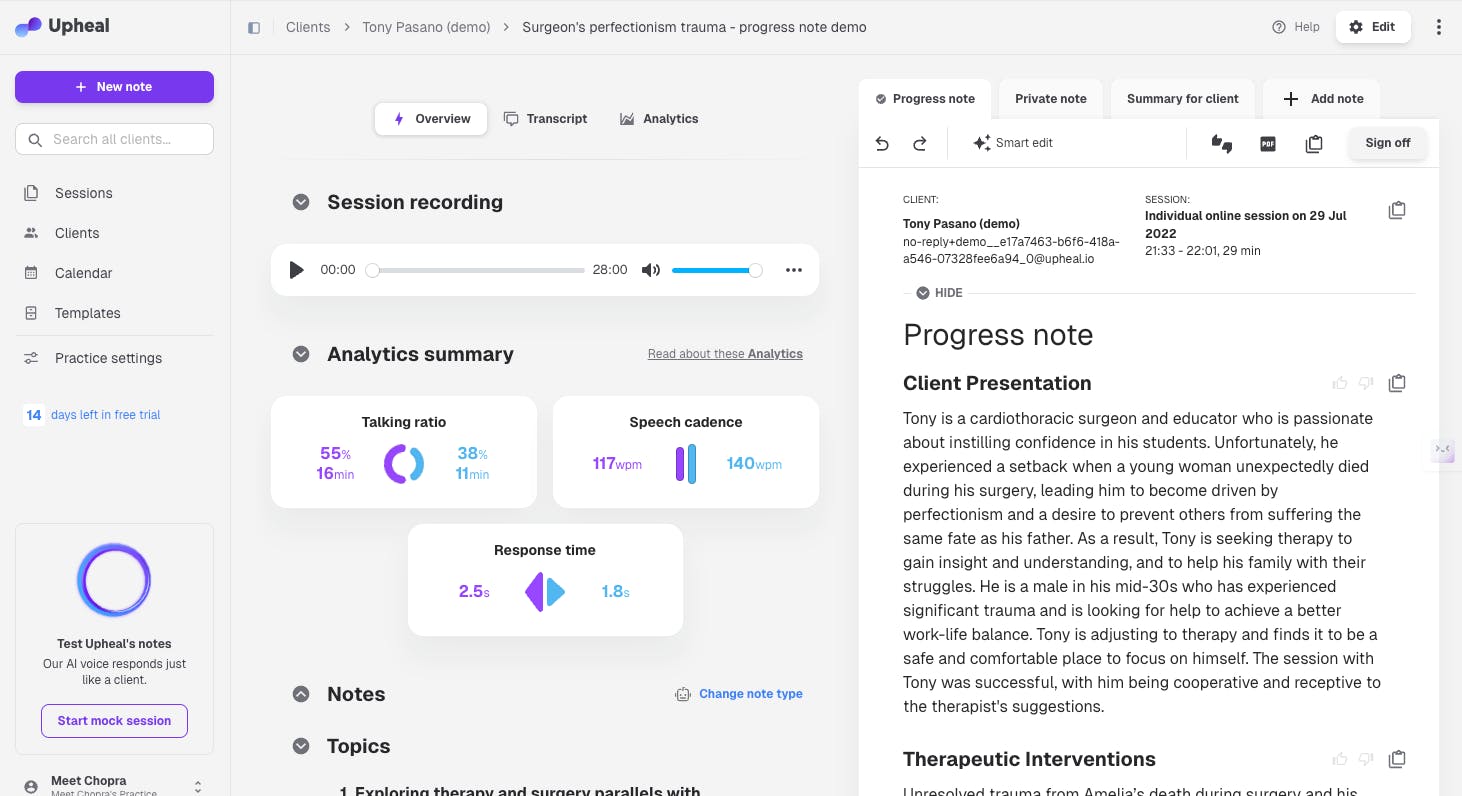
Upheal offers the most generous free tier in the mental health AI scribe space, making it attractive for providers testing AI powered documentation solutions.
- Unlimited basic notes available on the permanent free tier
- Built-in HIPPA compliant telehealth platform for seamless virtual patient visits
- Advanced session analysis providing insights into therapeutic patterns and progress
- Patient care outcome tracking and progress measurements
- Seamless integration capabilities with popular mental health electronic health record systems
Pricing: Free plan (£0/month, unlimited notes), Starter £19/month, Premium £59/month.
Best suited for: Healthcare professionals wanting to combine telehealth capabilities with ai medical documentation, or those testing ai scribes without financial commitment
Blueprint - Session-Based Mental Health Scribe
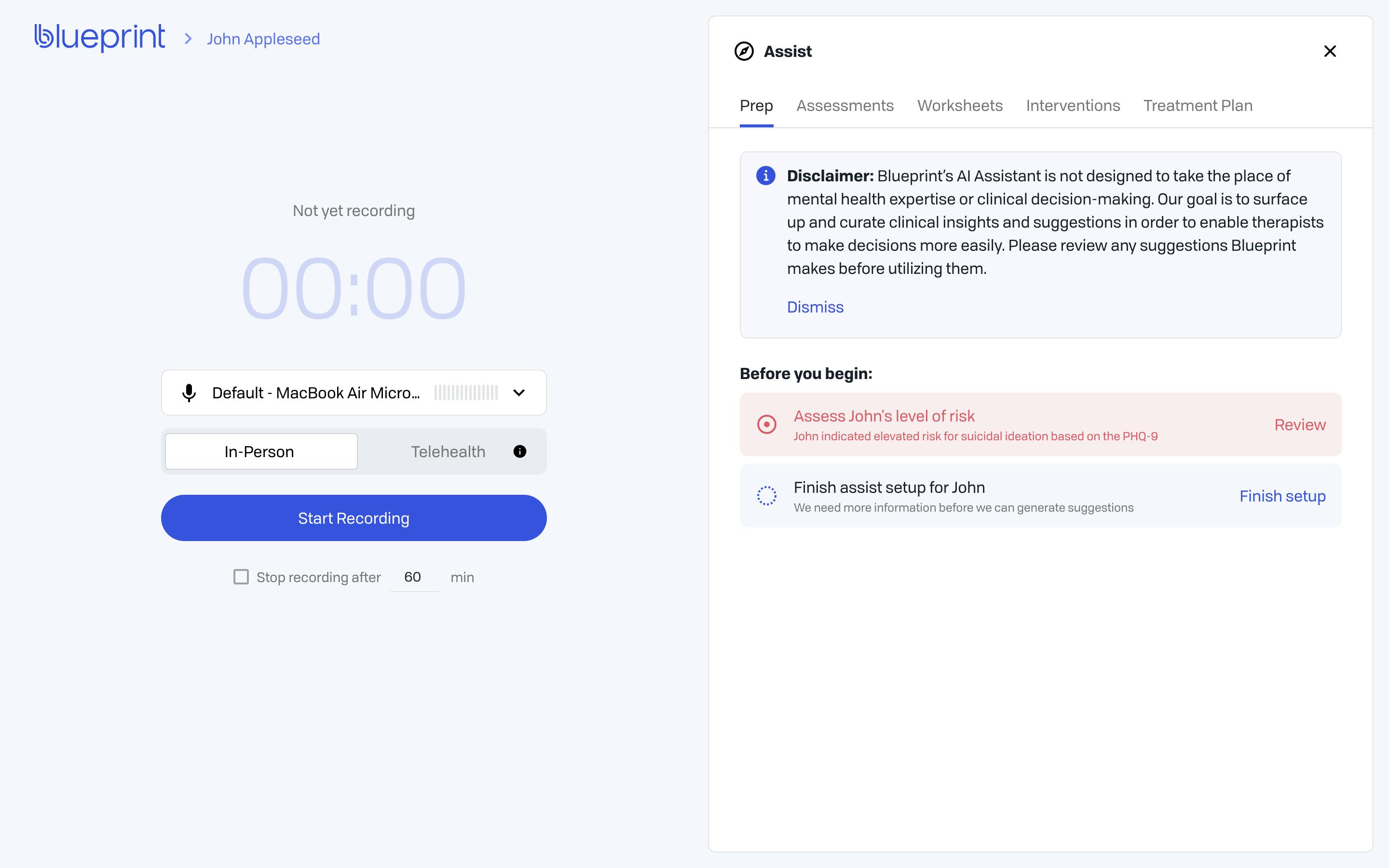
Blueprint takes a unique approach with session-based pricing, making it ideal for providers with variable patient loads or those just starting their practice.
- Flexible session-based pricing model that scales with your actual workflow usage
- Auto-upgrade features that adapt to your growing documentation needs
- Mental health-focused artificial intelligence trained specifically on therapy session patterns
- Blueprint 2.0 platform offers enhanced accuracy and faster processing for comprehensive clinical notes
- Customizable note formats for different therapeutic modalities and medical specialties
Pricing: Standard $0.49 per session, Plus $0.99 per session, Pro $1.49 per session.
Best suited for: Providers with fluctuating visit volumes or those preferring usage-based pricing over flat monthly rates
Freed.ai - General Medical with Mental Health Support
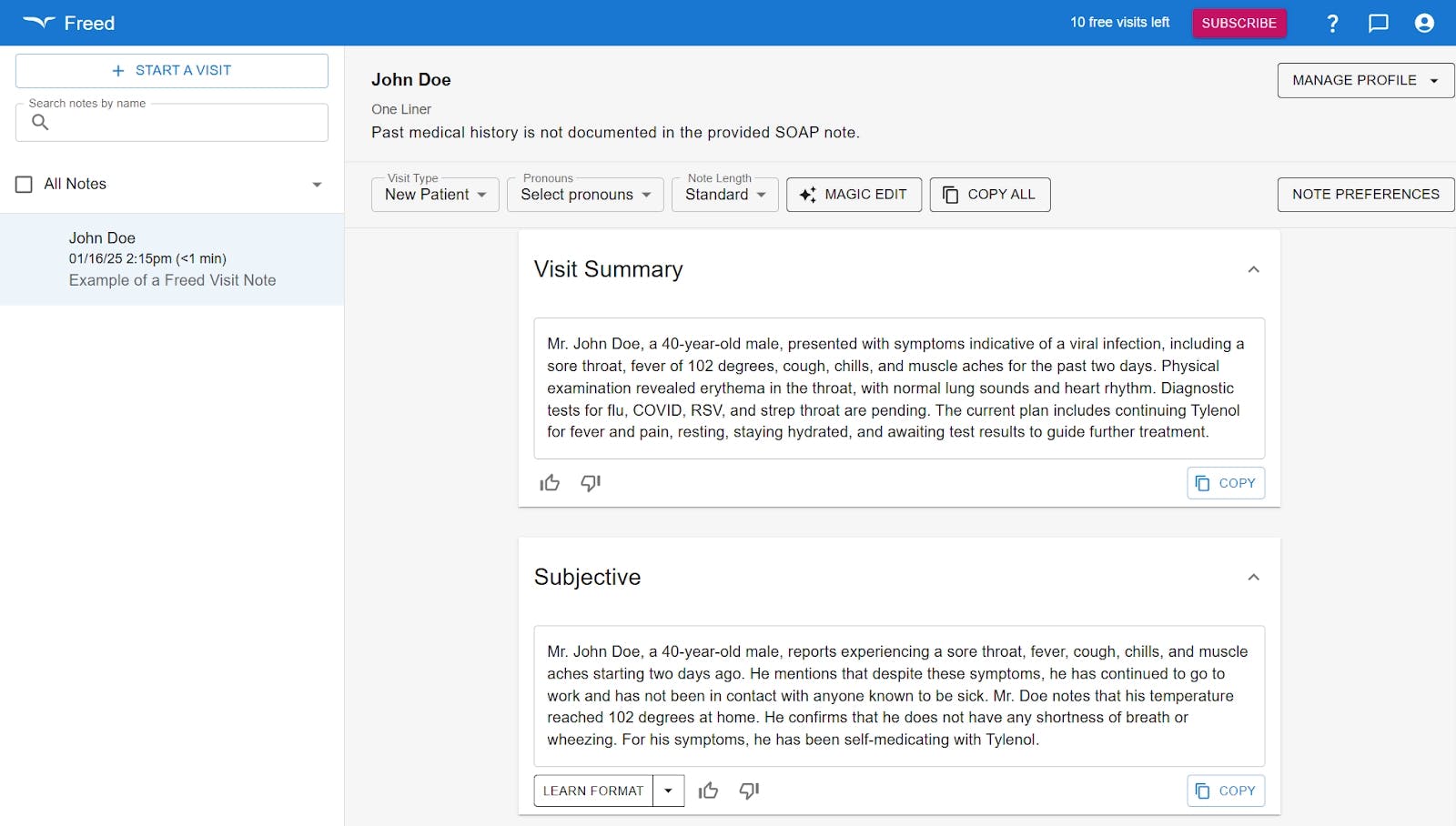
While not exclusively focused on mental health, Freed.ai offers robust support for therapy clinical documentation within its comprehensive ai medical scribe platform.
- Unlimited clinical notes for a flat monthly rate with no session restrictions
- Multi-specialty support including strong mental health capabilities for healthcare providers
- Advanced ai powered technology trained on diverse medical documentation including psychiatric notes
- No limits on session length or complexity for patient encounters
- 10 free patient visits trial to thoroughly test the platform
Pricing: Starts at $90/month for solo clinicians, $84/month per clinician for 2–9 users (billed annually), with custom pricing for 10+ users. 7-day free trial available.
Best suited for: High-volume mental health practices or multi-disciplinary small clinics serving diverse patients populations
Here’s a side-by-side comparison of the top AI medical scribe tools specifically evaluated for mental health practices:
Tool | Starting Price | Best For |
|---|---|---|
Supanote | $19.99/month (Free plan available) | Built for mental health, native EHR autofill |
Mentalyc | $19.99/month | SOAP/DAP templates, team collaboration |
Upheal | Free (unlimited basic notes) | Telehealth integration and session insights |
Blueprint | $29/month | Variable session volumes, auto-upgrade features |
Freed.ai | $99/month | High-volume practices, unlimited notes |
This comparison highlights the range of pricing models and specializations available, from Upheal’s generous free tier to Freed.ai’s unlimited flat-rate pricing for busy practices.
Key Selection Criteria for Mental Health Healthcare Providers
Choosing the right ai medical scribe for your practice requires evaluating three critical factors that directly impact your workflow and bottom line.
EHR Systems Integration and Workflow
The way an AI scribe connects to your EHR systems determines how much time you’ll actually save. Native seamless integration tools like Supanote offer one-click “Super Fill” buttons that push notes directly into your electronic health record.
This eliminates the copy-paste workflow required by tools like Mentalyc or Upheal for healthcare documentation.
Before committing to any platform, verify compatibility with your specific EHR systems. Some providers support dozens of medical specialties systems, while others work with only the most common ones.
Mental Health Specialization
General medical scribe solutions often struggle with therapy-specific language and concepts. Look for platforms that understand clinical terminology like “affect,” “thought process,” and “therapeutic alliance.”
The best mental health AI scribes offer:
- Pre-built SOAP and DAP note templates
- Customization for different therapeutic approaches (CBT, DBT, psychodynamic)
- Recognition of mental health assessment tools and interventions
Pricing and Value Considerations
Pricing models vary significantly across platforms. Per-note pricing (like Mentalyc at $19.99 for 40 notes) works well for part-time physicians.
Unlimited flat-rate options (like Freed.ai at $99/month) benefit high-volume practices.
Calculate your ROI based on documentation time savings. If you save 15 minutes per patient visit and see 20 patients weekly, that’s 5 hours saved monthly, often worth far more than the subscription cost.
Always start with free trials to test real-world workflow integration before making long-term commitments.
Implementation Best Practices
Successfully adopting ai medical scribes requires a structured approach that minimizes disruption while maximizes benefits for patient care.
Start Small and Test Thoroughly
Begin with free trials from multiple healthcare providers to evaluate workflow compatibility. Most tools offer 7-14 day trials, giving you time to test with real sessions.
Focus on how seamlessly each solution integrates with your current documentation process.
Customize for Your Practice Style
Spend time training the ai on your specific documentation preferences. Upload sample notes or provide feedback during initial sessions to help the system learn your clinical language and preferred note structure.
This investment pays dividends in accuracy for patient information.
Establish Quality Control Processes
Create a systematic review process for ai generated clinical notes before finalizing them in your ehr systems. Even the best ai medical scribe tools require human oversight to ensure clinical accuracy and completeness.
Secure Proper Client Consent
Update your intake forms and consent processes to explicitly address session recording for medical documentation purposes. Be transparent about how recordings are processed and stored.
Most patients appreciate that this technology allows you to be more present during sessions and maintain better eye contact.
Frequently Asked Questions
Q: Do I need client consent to use AI scribes during sessions?
A: Yes. Always obtain explicit consent before recording sessions for AI transcription. This protects you legally, reassures clients, and promotes transparency about how their information will be documented. Many clients appreciate that AI scribes allow you to stay more present and maintain better eye contact during sessions.
Q: How accurate are AI-generated therapy notes compared to manual documentation?
A: Most AI medical scribes reach 85–95% accuracy for mental health content, thanks to machine learning and natural language processing. Accuracy improves as the system learns your style, but you should always review and approve notes before adding them to your EHR.
Q: Can AI medical scribes integrate directly with my existing EHR system?
A: Integration varies. Some tools (like Supanote) offer direct, one-click EHR integration, while others require a copy-paste workflow. Always confirm compatibility with your current EHR before committing.
Q: What if the AI misunderstands sensitive medical terminology?
A: Even specialty-trained AI can misinterpret terms. That’s why it’s best practice to review all generated notes. Most platforms allow you to flag corrections, helping the AI improve over time.
Q: Are AI medical scribes HIPAA compliant?
A: Reputable platforms are HIPAA compliant, use encryption, and sign a Business Associate Agreement (BAA). Always request documentation of compliance before using a tool for client records.
Q: How much time can I save with an AI medical scribe?
A: Most clinicians save 15–30 minutes per session, which adds up to several hours each week. Many find that it significantly reduces “pajama time” spent finishing notes after hours.
Q: Do AI scribes work with all therapeutic approaches?
A: Yes, as long as the platform offers customizable templates. The best tools support SOAP, DAP, CBT, DBT, EMDR, and other therapy frameworks, adapting to your preferred documentation style.
Q: What’s the learning curve like?
A: Most providers become comfortable within 1–2 weeks. Onboarding often includes training the AI on your sample notes, adjusting templates, and setting up review processes.
Q: Can I use AI scribes for group therapy sessions?
A: Some platforms can handle group sessions, but accuracy may be lower with multiple speakers. You’ll need consent from every participant before recording.Conclusion
Conclusion
Choosing the right AI medical scribe depends on your workflow, documentation volume, and integration needs. Start with a free trial and test it with real sessions to see how it fits your practice.
For mental health providers, specialized AI scribes, like Supanote, offer templates, security, and EHR integration designed specifically for therapy. These tools free you from hours of manual note-taking, allowing you to focus more fully on your clients.
Whether you’re in solo practice or part of a larger health system, AI-powered documentation can cut your admin time in half, improve note quality, and protect client privacy through HIPAA-compliant processes.
The future of mental health documentation is less about typing and more about connecting, with clients, not keyboards.


